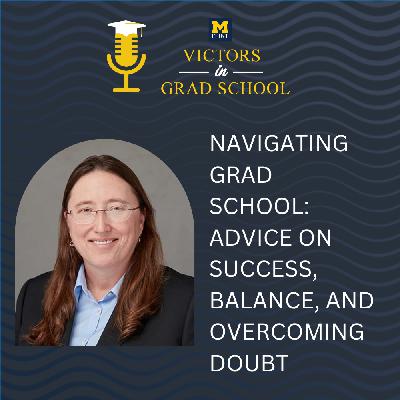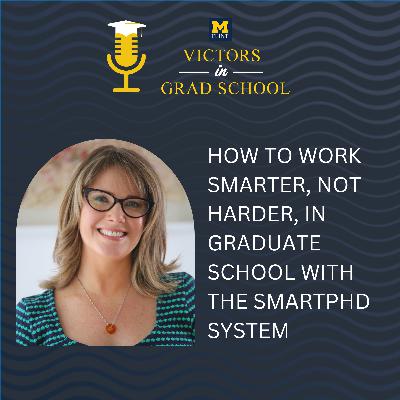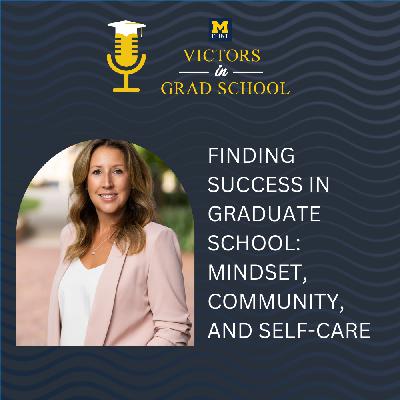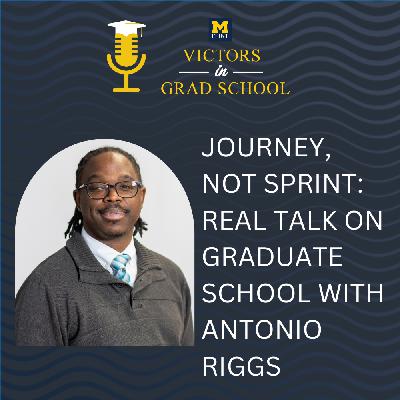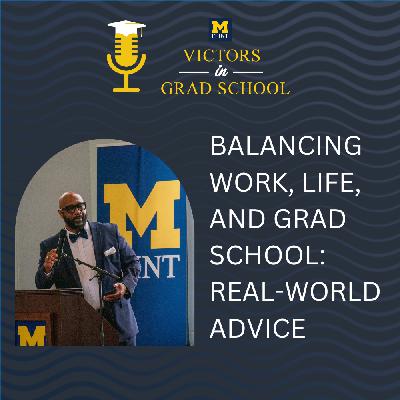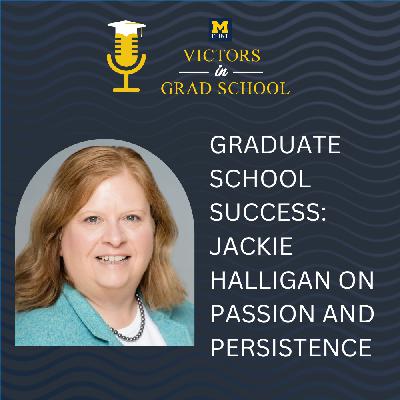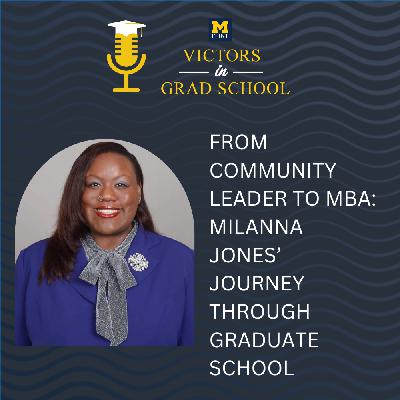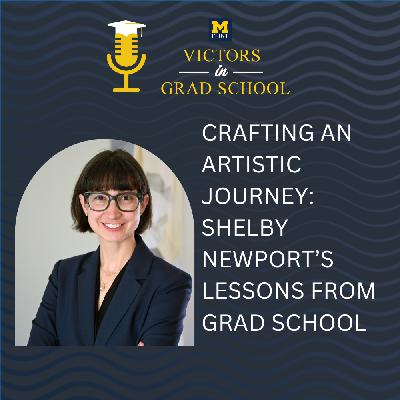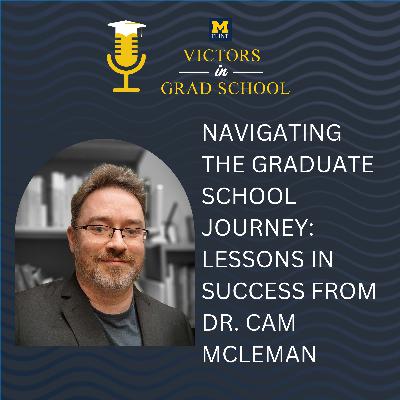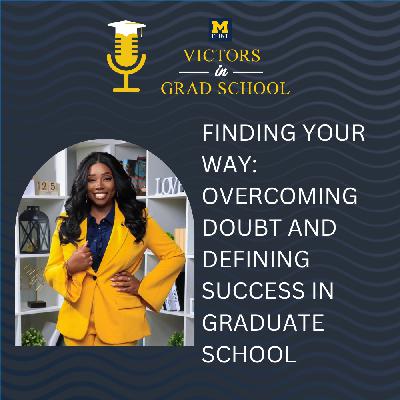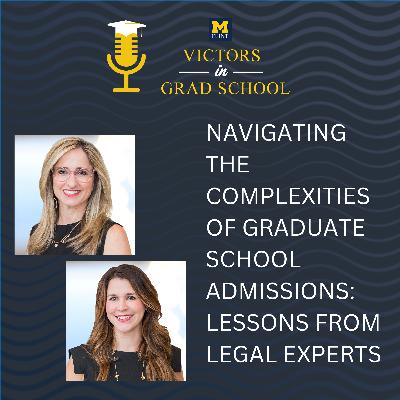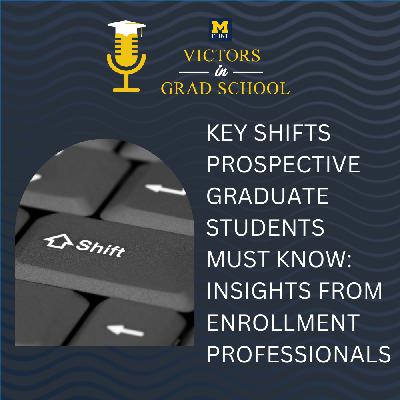Navigating Grad School: Advice on Success, Balance, and Overcoming Doubt
Description
Graduate school is often called a journey, and for good reason. In the latest episode of the "Victors in Grad School" podcast, host Dr. Christopher Lewis sits down with Dr. Abby Parrill, the Provost and Vice Chancellor for Academic Affairs at the University of Michigan-Flint, to unpack what it truly takes to succeed as a graduate student. Whether you’re contemplating applying, awaiting your first semester, or knee-deep in research, the experiences and advice shared in this episode offer practical guidance and inspiration for every stage of the process.
One of the key themes Dr. Parrill discusses is intentional decision-making—knowing why you’re choosing graduate school and how it aligns with your long-term goals. She recounted how, as an undergraduate at Central Michigan University, her co-op experience at Dow Chemical revealed to her that advanced degrees opened doors to more autonomy and interesting projects, prompting her to further her education immediately, rather than settling into a job right away.
Dr. Parrill also shares her experience of choosing the right graduate program, highlighting the importance of considering personal and professional factors. Her decision to attend the University of Arizona was influenced not only by its academic offerings but also by where both she and her then-fiancé could study complementary fields on the same campus.
Preparation is another recurring theme. Academic preparation, such as building a solid foundation during undergrad and leveraging work experiences, paid off for Dr. Parrill—especially when it came to placement exams and early graduate coursework. She stresses the importance of treating graduate school as a full-time commitment, dedicating oneself not just in the classroom but also through research, networking, and even tutoring or mentoring others.
The transition to graduate-level work often brings feelings of imposter syndrome and self-doubt. Dr. Parrill’s candid insights into these struggles—and the importance of leaning on mentors and building supportive networks—underscore that such challenges are common, but surmountable.
Finally, Dr. Parrill shares wisdom on balancing responsibilities and being intentional about time management, whether you’re juggling teaching, research, work, or family obligations. Her advice, derived from mentoring students with complex lives and her own experience, rings true for anyone seeking to thrive in graduate school and beyond.
Are you considering graduate school, or are you currently navigating its demands? Tune into this episode for actionable tips, personal stories, and the reassurance that the path, while challenging, is absolutely rewarding.
Listen to the full episode to glean more practical advice and inspiration to fuel your graduate school journey!
TRANSCRIPT
Dr. Christopher Lewis [00:00:01 ]:
Welcome to the Victors in Grad School, where we have conversations with students, alumni, and experts about what it takes to.
Dr. Christopher Lewis [00:00:08 ]:
Find success in graduate school. Welcome back to Victors in Grad School. I'm your host, Dr. Christopher Lewis, Director of Graduate Programs for the University of Michigan Flint. Really excited to have you back again this week. And as always, we are here to talk with you, to work with you on this journey that you're on. And I call it a journey, because it truly is a journey. And every one of us, as we think about graduate school, have to go through a process to be able to prepare ourselves, to work through the process of not only applying to graduate school, getting into graduate school, but getting through graduate school.
Dr. Christopher Lewis [00:00:41 ]:
And to do that, there are things that you can do to find success in that journey, and that's why this podcast exists every week. I love being able to bring you different guests with different experiences, people from different walks of life that have gone before you. They've gone to graduate school, they've been successful, they've come out the other end mostly unscathed, and they have been able to learn things along the way. Learn things about themselves, but learn things about the process of going to graduate school and what they had to do to find success. This week, we've got another great guest. Dr. Abby Parrill is with us today, and Dr. Perel is the Provost and Vice Chancellor for Academic affairs at the University of Michigan Flint.
Dr. Christopher Lewis [00:01:23 ]:
And Dr. Parrill joined the University of Michigan Flint about a month ago. She has transitioned from working at the University of Memph for a number of years, and now she's here, and I'm really excited to have her here to talk to you about her own experiences and to be able to help you better understand some of the things that she had to learn along the way. Dr. Pero, thanks so much for being here today.
Dr. Abby Parrill [00:01:46 ]:
Absolutely. Thank you for the invite.
Dr. Christopher Lewis [00:01:48 ]:
Well, I really appreciate being able to talk with you today. I'm always excited to be able to learn from other people and the journey that they're on. And I know that when you were in your undergraduate work, at some point back at Central Michigan University, there was a point in time. There was a point in time where you made a decision. You made a decision that you were going to continue your education, weren't going to just finish that degree and go off and work and maybe go over to Dow Chemical down the road, but you made a decision to continue on. Can you take me back to that point and what was going through your head and what made you Decide that that was the right step at that point.
Dr. Abby Parrill [00:02:25 ]:
Absolutely. So it's funny you mentioned Dow Chemical, because I was actually in the cooperative education program at Dow Chemical while I was an undergraduate student. Great learning experience. Let me see how to use what I was learning in the classroom in a real chemistry lab. But one of the things I learned was that the chemists that had doctoral degrees had a lot more autonomy and more interesting projects. And those with bachelor's degrees tended to do very routine, repetitive things that did require chemistry knowledge. And I enjoyed doing those routine, repetitive things as an undergraduate student because it allowed me to get really good at a few of the skills I had learned as an undergraduate. But I couldn't see myself doing that for 10, 15, 20 more years.
Dr. Abby Parrill [00:03:10 ]:
And there had been a panel held, sponsored by Central Michigan University, I think it was our student affiliates of the American Chemical Society sponsored a panel about graduate school, med school, or work as being some of the common directions someone might go after right after completing the bachelor's degree. And there were people on the panel who had started employment first and then gone to graduate school and others who had gone straight to graduate school. And they talked about kind of the challenge of getting into the work environment, getting used to a particular salary, and then stepping back to graduate school and going back to that kind of restricted income as being a very sincere challenge that they faced. And I decided that since I knew I didn't want to remain at the bachelor's level for my entire career, that I was just going to grit my teeth and move on and get the graduate degree right away.
Dr. Christopher Lewis [00:04:09 ]:
Now, one of the things that I always am interested in is, you know, you decided to go and continue your education, like you mentioned, and you ended up applying to schools. But I'm sure that you went through a process of exploring schools to try to find the right fit, and you ended up finding a fit at the University of Arizona doing organic chemistry. Talk to me about that process that you went through for yourself to explore, but also to identify that final decision of the University of Arizona. And what was it about the University of Arizona that made it the best fit for you?
Dr. Abby Parrill [00:04:48 ]:
So searching for graduate schools was very different when I was searching for graduate schools than it would be for today's prospective graduate students. My first shopping for graduate schools was to go to the big rings that our undergraduate institutions had bolted on the wall. And they had big paper flyers hanging from these rings. And each flyer was for a specific graduate program in chemistry. And they had little tear off cards, and you could fill out your contact information and put them in the mail. And they would mail you information much faster. Now to use the all of the wonderful online tools you have, you can go to a website and shop instead of having to send off a card and wait. But another avenue of exploration is very much relevant today, and that's to talk to your faculty.
Dr. Abby Parrill [00:05:36 ]:
I asked some of my faculty. I'm looking at this three foot thick pile of programs and I have no idea how to choose. And I got a piece of interesting advice from one of my undergraduate faculty members who said, try somewhere really different for graduate school. Because graduate school is a limited period of time. Once you graduate, you have the opportunity to stay near where you go to graduate school or go somewhere else if you don't like that that region of the country or that part of the world. And I found that very interesting advice. And so a

